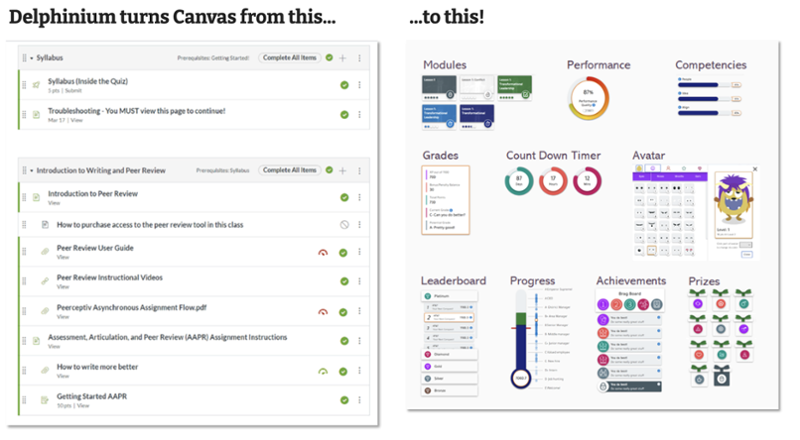Even if you've never played a video game in your life, you have to admire the ways in which games captivate the interest of our students and keep them engaged as they learn to play. Imagine students being as thirsty and persistent about learning your course content as they are about games! We can build and adapt our curriculum to include many gaming principles.
Key gaming features include visually appealing interfaces, zero-up scoring, choice, and freedom to fail. IU is piloting a Canvas overlay tool called Delphinium that creates a game-esque interface for your Canvas course site and facilitates these motivational learning strategies.
Visual Appeal/Zero-Up Scoring

The Delphinium plug-in makes a typical Canvas course front page look far more colorful and game-like. You can opt to include elements like avatars, prize boxes, and leaderboards to add playful intrigue to your content.
By adding a visual progress bar, you can also help students see progress toward their learning goals. More importantly, you can shift their focus away from traditional notions of grading, in which they perceive that they begin with 100% and lose points throughout the semester.
Student Choice (and Freedom to Fail)
Choice puts students in control of their learning.1 Universal Design for Learning, a framework to optimize learning for all people, is grounded in choice including multiple means of engagement, representation, and action or expression.2 Choice is one of three ideal characteristics of classrooms (along with collaboration and content) according to human behavior, education, and parenting author Alfie Kohn.3
To integrate choice into your class, you could:
- Create a cafeteria-style selection of assignments (or choose-your-own adventure)
- Allow flexibility in due dates
- Give students options for HOW to submit an assignment (written, oral, team, individual)
Building out a menu-style assignment list in Canvas currently requires clunky workarounds. Likewise, zero-up scoring (as opposed to traditional grading) is motivating but very difficult to create in the standard Canvas Gradebook. Delphinium allows for increased student choice without complicated workarounds or confusing Gradebook entries.
Rather than penalizing students, this approach focuses on finding better ways to motivate them—not to mention to encourage them to experiment and take risks. Essentially, students take control of their learning by choosing which path to take toward content mastery. And, as they see themselves moving closer to their learning goals, they're increasingly on fire to keep going.
Ways to get involved: If you're interested in trying something similar, sign up for the Delphinium pilot at Next.IU.
For more on Delphinium, including its messaging features, read this issue's Emerging Tech column. And please join us for one of our two faculty-focused webinars!
1. Pink, D. (2009). "Drive: The surprising truth about what motivates us"
2. CAST (2018). Universal Design for Learning Guidelines version 2.2. Retrieved from https://udlguidelines.cast.org
3. Kohn, A. (1993). "Punished by Rewards: The Trouble with Gold Stars, Incentive Plans, As, Praise, and Other Bribes"


